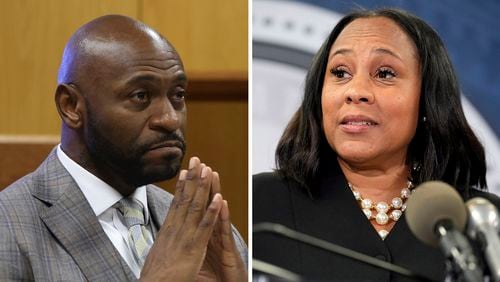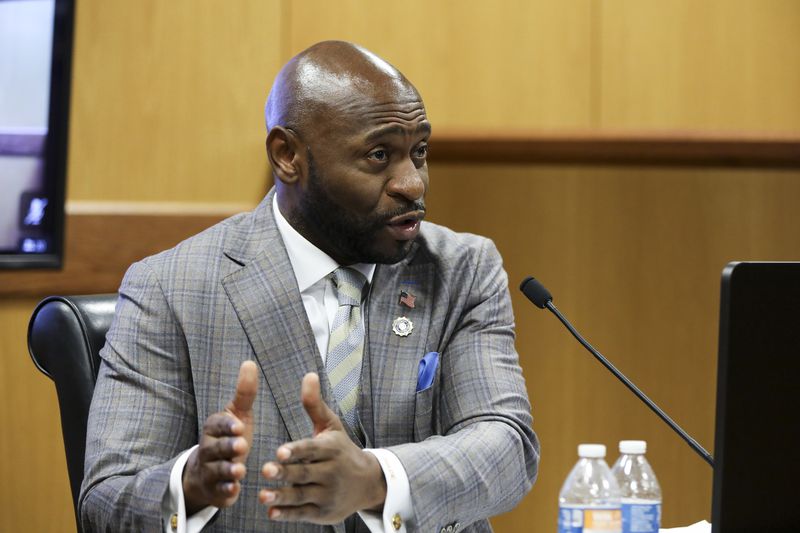Nathan Wade appeared to make at least 35 visits to the Hapeville neighborhood where Fani Willis was living before the district attorney hired him to lead Fulton County’s election interference prosecution, according to cellphone data included in a court submission filed Friday.
The filing, by attorneys for Donald Trump, raises fresh questions about the relationship between the two prosecutors, which the former president and other defendants argue has tainted the case against them and should result in Willis and her office being disqualified.
Late Friday, Willis disputed the defendants’ evidence in a court motion seeking to have it excluded. She said the submission was filed in violation of court rules and “do not prove anything relevant.”
“The records do nothing more than demonstrate that Special Prosecutor Wade’s telephone was located somewhere within a densely populated multiple-mile radius where various residences, restaurants, bars, nightclubs and other businesses are located,” Willis’ motion said.
Trump’s lawyers relied on data collected from Wade’s cellphone and the “pings” it made off cellphone towers close to Willis’ condo. However, some experts interviewed by The Atlanta Journal-Constitution questioned the accuracy of the findings. Others said the technology was generally accepted in court proceedings around the nation and considered trustworthy.
If the findings are correct, they could contradict Wade’s testimony last week that he had visited Willis at her condo in Hapeville no more than 10 times before he was hired in November 2021. The data also indicates that in the months before Willis and Wade said their relationship became romantic early in 2022, Wade’s phone twice arrived in the area late at night and left early the next morning.
Both Wade and Willis testified last week that they did not spend the night together at the Hapeville condo.
The timeline of the Willis-Wade relationship is important for two reasons. If they were a couple before she hired him it raises the prospect that she may have violated at least the spirit of anti-nepotism rules, though Fulton’s policy specifically focuses on family members. More importantly, both Willis and Wade have testified under oath that the relationship began in 2022. If defense attorneys can prove that they lied under oath it could constitute perjury.
The Trump court filing included an affidavit from Charles Mittelstadt, a longtime investigator for defense attorneys. He said he obtained the cellphone data from AT&T through a subpoena.
Mittelstadt said he used the online tool, CellHawk, to determine where Wade’s phone was in 2021. “CellHawk is considered by law enforcement to be the gold standard in cellphone records analytics,” Mittelstadt said, noting it is used by law enforcement throughout the U.S. and Georgia.
The affidavit says Willis and Wade called each other more than 2,000 times during the first 11 months of 2021 and exchanged nearly 10,000 text messages.
Mittelstadt said he focused on instances when Wade’s cellphone connected to a tower near Willis’ Hapeville address for extended periods to make sure he was stationary and not in transit. He said he did the same thing to determine when Wade was at his home in East Cobb County.
On one occasion, on Sept. 11, 2021, Wade’s phone left a third location in the Doraville area and arrived in the vicinity of Willis’ Hapeville address at 10:45 p.m. The phone remained there until 3:28 a.m. and could later be seen arriving in East Cobb at 4:05 a.m., shortly before Wade sent a text to Willis, the affidavit said.
Similarly, Wade’s phone left the East Cobb area the night of Nov. 29, 2021, after receiving an 11:32 p.m. call from Willis, the affidavit said. It arrived in Hapeville at 12:43 a.m. and remained there until 4:55 a.m., the affidavit added.
Mittelstadt “is available to testify at the court’s convenience,” said the filing, by Trump attorneys Steve Sadow and Jennifer Little.
In his affidavit, Mittelstadt said he used a “conservative geofence” – a virtual perimeter around a location – by isolating two cell towers that were closest to the Hapeville home. One tower is 2,000 feet away and the other is 3,000 feet away. This encompassed area could include several nearby restaurants in the vicinity of the home, which is also less than a mile away from a number of hotels that serve the airport.
The Hapeville condo is less than two miles from Hartsfield-Jackson International Airport but Mittelsatdt said his analysis had eliminated the possibility that the phone was in the airport.
Experts offered different assessments of the investigator’s analysis.
John Acevedo, an Emory University professor who specializes in criminal law, said CellHawk is “referred to as the gold standard of software.”
“It is one of the most used softwares in the country and is very reputable and accepted,” Acevedo told the AJC. “The analysis (of Wade’s cellphone data) appears to be sound. I think we’re going to have to hear from him as to what he was doing in the area on those dates.”
But there is reason to doubt the conclusions by the defendants’ investigator, said Georgia Tech electrical and computer engineering professor Paul Steffes, who has testified about cellphone location data in court cases.
Steffes said he would need to review the underlying data used in the investigators’ analysis before drawing a definitive conclusion, but he reviewed the summary of the investigation included in the affidavit filed Friday.
It does not show definitively that Wade visited Willis at her Hapeville condo — at best, the evidence appears to show Wade was in a 9-square-mile area that includes Willis’ condo, Steffes said.
The data also does not prove that Wade stayed in one place – he could have been driving around the area, he added. “This sounds to me like these folks are not experienced and they don’t understand the limits of either the data or the tool they’re using.
Willis echoed Steffes’ critique in her response late Friday.
“The records do not prove, in any way, the content of the communications between Special Prosecutor Wade and District Attorney Willis; they do not prove that Special Prosecutor Wade was ever at any particular location or address; they do not prove that Special Prosecutor Wade and District Attorney Willis were ever in the same place during any of the times listed [in the exhibit],” Willis’ motion said.
In fact, the motion said on multiple dates and times cited in the defense analysis, Willis was not at home. She provided copies of calendar entries to support that contention - including entries she said show she was at the office or at murder crime scenes.
Willis’ motion argued the defense exhibit should not be accepted as evidence because, among other things, the defendants violated the court’s rules on the disclosure of expert testimony. She argued the evidence is “clearly inadmissible and has little evidentiary value” and “is simply another attempt to garner media attention.”
It will now be up to Fulton Superior Court Judge Scott McAfee to decide whether to admit Mittelstadt’s affidavit and the phone records into evidence.
Credit: TNS
Credit: TNS
Former DeKalb County District Attorney Robert James said the cellphone data raises questions.
“People could look at this and be suspicious,” James said. “But in the court of law, you need proof. The real question is whether there was proof there was a romantic relationship at that time and I don’t think this proves there was. It just proves a relationship, which they’ve already acknowledged.”
Questioned at the Feb. 15 hearing by Sadow, Willis said Wade visited her at the Hapeville condo before she hired him in November 2021. On one occasion, Willis recalled a time when he picked up food from the Lickety Split Southern Kitchen & Bar and brought it to the condo.
As to how many times Wade paid her a visit in 2021, Willis testified, “I don’t think often, but I don’t – I don’t want to speculate.”
When pressed for a number by Sadow, Willis said, “Let’s say more than 10, but I’m not sure that that’s even accurate. He certainly has come and picked me up, gone and grabbed some food to eat. I don’t remember him being in that condo a lot.”
No one, except maybe one of her daughters on one occasion, ever spent the night with her at the Hapeville condo, Willis testified.
Earlier in that hearing, Sadow asked Wade how frequently he visited Willis’ condo before November 2021. Wade testified that it was not more than 10 times.
Sadow suggested phone records could demonstrate Wade was there more than he had let on.
“So, if phone records were to reflect that you were making phone calls from the same location as the condo before Nov. 1 of 2021, and it was on multiple occasions, the phone records would be wrong?” Sadow asked Wade.
“If phone records reflected that? Yes, sir,” Wade responded.
“They’d be wrong?” Sadow asked.
“They’d be wrong,” Wade responded.
Wade said he could have been in the Hapeville area for any number of reasons. He said he could have been visiting the Porsche Experience Center, the airport, the Delta Air Lines headquarters or local restaurants.
At last week’s hearing, Willis and Wade’s testimony was contradicted by Robin Yeartie, a former colleague and friend of the DA’s who allowed Willis to sublet the Hapeville condo.
Yeartie testified that she had “no doubt” that Willis and Wade began their romantic relationship shortly after they met in 2019. She also testified that she had seen them “hugging, kissing” and being affectionate.
Both Willis and Yeartie testified that they had a falling out in 2022, after Yeartie left the DA’s office due to poor performance, and the two have not spoken since then. Prosecutors sought to frame Yeartie as a disgruntled former employee who might have an ax to grind with Willis.
Willis owns a house in South Fulton but moved out in early 2021 due to security concerns. Her father, who lived with her for a time, testified last week that people showed up outside the house shouting curse words and racial epithets at Willis.
It got so bad police regularly showed up at the home with bomb-sniffing dogs, John Clifford Floyd III, Willis’ father, said. Willis moved out of her home and into the condo rented by Yeartie.
Staff writer Rosie Manins contributed to this report.











